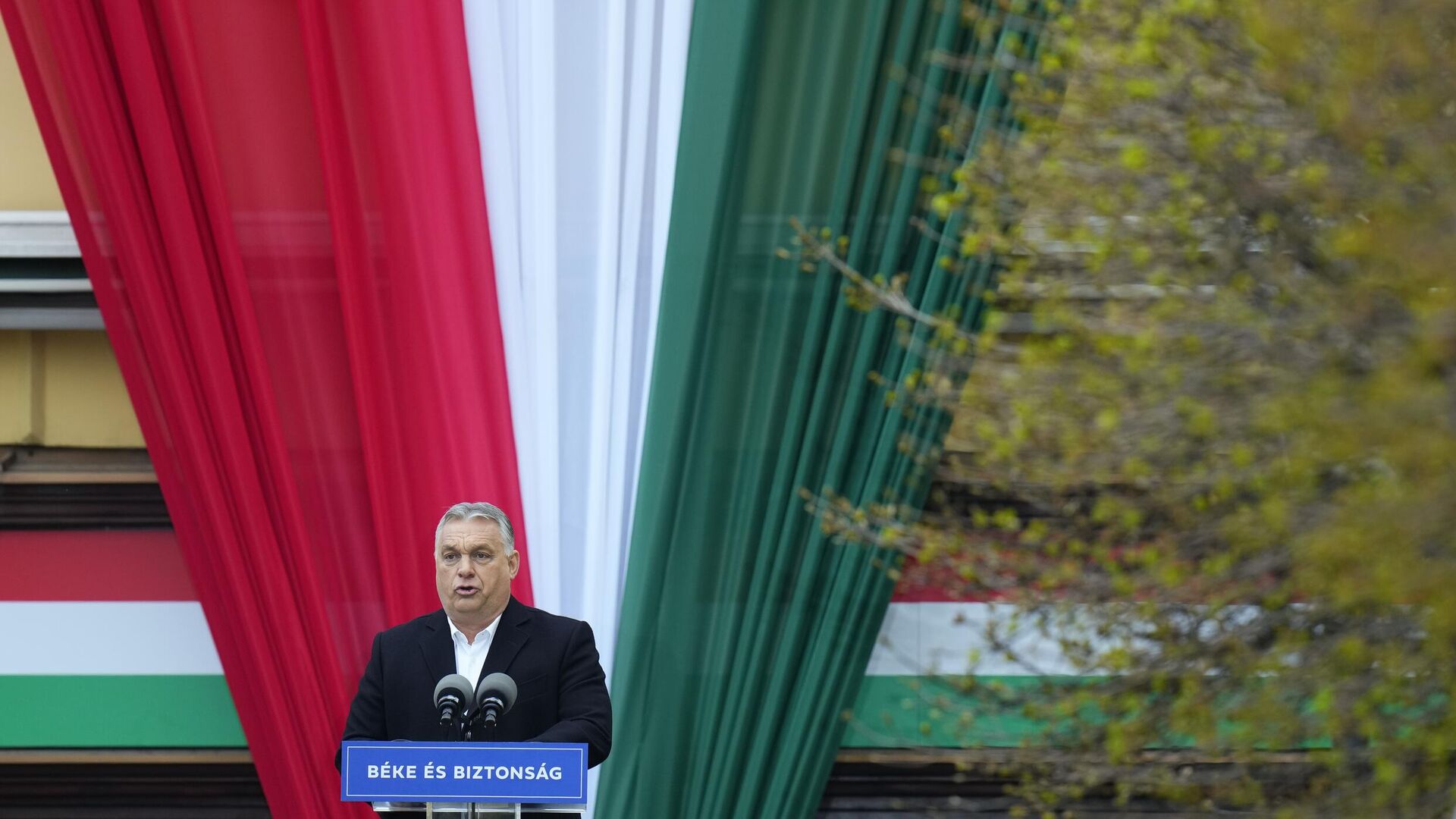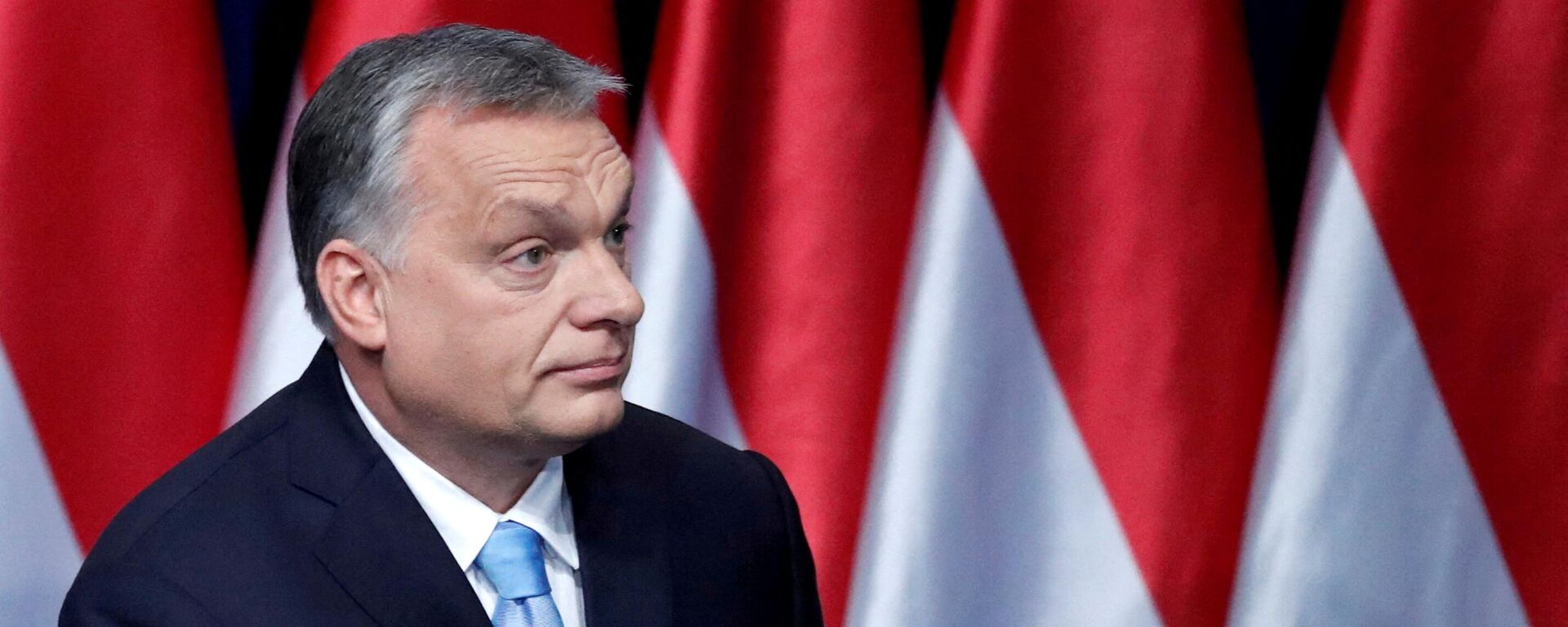https://sputnikglobe.com/20220403/hungarians-head-to-polls-in-election-pitting-ruling-right-against-united-opposition-1094431256.html
Hungarians Head to Polls in Election Pitting Ruling Right Against United Opposition
Hungarians Head to Polls in Election Pitting Ruling Right Against United Opposition
Sputnik International
MOSCOW (Sputnik) - Hungarians are heading to polling stations on Sunday to participate in parliamentary elections, deciding whether the ruling right-wing... 03.04.2022, Sputnik International
2022-04-03T00:00+0000
2022-04-03T00:00+0000
2024-03-11T10:57+0000
hungary
viktor orban
election
https://cdn1.img.sputnikglobe.com/img/07e6/04/02/1094431005_0:650:2485:2048_1920x0_80_0_0_29610507cc266b82afe695db304293ca.jpg
ProcedureThe election will decide the composition of the country's unicameral parliament, known as the National Assembly and consisting of 199 lawmakers elected to four-year terms.Hungary has a mixed electoral system, in which 106 lawmakers are chosen in first-past-the-post races in single-member constituencies, while 93 lawmakers will be elected in a nationwide vote for parties that pass the 5% threshold.According to the National Election Commission, 43 parties and 664 candidates will vie for seats in the national legislature.Participants and StakesThe main question of the elections is whether Fidesz, which is running in alliance with the Christian Democratic People’s Party, will maintain its hold on power against the United for Hungary electoral bloc, which is comprised of an array of opposition parties — the socially liberal Democratic Coalition, the far-right Jobbik, the centrist Momentum Movement, the Hungarian Socialist Party, the Hungary’s Green Party, and the green Dialogue for Hungary. Other major contenders include the far-right Our Homeland Movement and the joke Hungarian Two-Tailed Dog Party.Despite joining forces, the opposition parties still trail behind Fidesz, which is projected to win, according to polls.Jose Pedro Zuquete, a senior research fellow at the Lisboa-based Instituto de Ciencias Sociais, told Sputnik that the election will serve as a referendum on the government of Hungarian Prime Minister Viktor Orban, which could have serious political and social ramifications for the country and beyond.The expert noted that Hungarians will be explicitly asked about the legitimacy of LGBTQ+ teachings in schools, as a referendum on the matter coincides with the election, and thus "obviously cultural issues will be on the ballot."UkraineOne unexpected factor is Russia's military operation in Ukraine and the subsequent response by the European Union. Orban has previously spoken out against extending anti-Russian sanctions to energy resources, as this would lead to a slowdown and halt of the Hungarian economy, while Foreign Minister Peter Szijjarto has said that Hungary would not allow the transfer of weapons to Ukraine through its territory, despite Kiev asking for it.Budapest's position did not fly with Ukrainian President Volodymyr Zelensky, who criticized Hungary for opposing the introduction of sanctions on Russian energy and a no-fly zone over Ukraine, and for declining to supply Kiev with weapons or allow transferring them through Hungarian territory.Earlier this week, Szijjarto accused Ukraine of attempting to influence the parliamentary elections and holding talks with the opposition, saying that the latter promised to agree to weapons supplies and vote for sanctions against Russian oil and gas as soon as it comes to power.Due to the ongoing crisis in Ukraine, the issues of security and geopolitics may supplant the issues of traditional values in the election, as many Hungarians will be preoccupied with the question of how to advance the country's interests and safety, Zuquete said, noting that "the opposition is aware of this and immediately after the beginning of the conflict put up billboards in the streets showing Orban and [Russian President Vladimir] Putin with the message 'Putin or Europe?’"The expert sees Hungarian society divided between the "National" camp that wants to keep the country neutral and the "Left" camp, which "will endanger the country's neutrality, dragging it into a potential war and even running the risk of cutting off Hungary's energy sources."The social scientist drew attention to another geopolitical aspect in this election: the future of the Visegrad Group — Hungary, Poland, Slovakia and the Czech Republic — one of Orban's foreign policy feats in the battle against the EU's liberal policies."The Russian-Ukrainian conflict has marginalized Orban – Hungary has been the only member who has openly declared neutrality in stark contrast, especially, with Poland," Zuquete said, adding that "we’ll see, in the coming months, whether the Visegrad Alliance will survive – but if it doesn’t it will be a major blow to Orban’s counter-revolution."
https://sputnikglobe.com/20220326/hungarian-pm-orban-lashes-back-at-zelensky-over-criticism-for-not-backing-anti-russia-sanctions-1094218498.html
hungary
Sputnik International
feedback@sputniknews.com
+74956456601
MIA „Rossiya Segodnya“
2022
Sputnik International
feedback@sputniknews.com
+74956456601
MIA „Rossiya Segodnya“
News
en_EN
Sputnik International
feedback@sputniknews.com
+74956456601
MIA „Rossiya Segodnya“
Sputnik International
feedback@sputniknews.com
+74956456601
MIA „Rossiya Segodnya“
hungary, viktor orban, election
hungary, viktor orban, election
Hungarians Head to Polls in Election Pitting Ruling Right Against United Opposition
00:00 GMT 03.04.2022 (Updated: 10:57 GMT 11.03.2024) MOSCOW (Sputnik) - Hungarians are heading to polling stations on Sunday to participate in parliamentary elections, deciding whether the ruling right-wing Fidesz party will maintain its dominance or give way to the opposition.
The election will decide the composition of the country's unicameral parliament, known as the National Assembly and consisting of 199 lawmakers elected to four-year terms.
Hungary has a mixed electoral system, in which 106 lawmakers are chosen in first-past-the-post races in single-member constituencies, while 93 lawmakers will be elected in a nationwide vote for parties that pass the 5% threshold.
According to the National Election Commission, 43 parties and 664 candidates will vie for seats in the national legislature.
The main question of the elections is whether Fidesz, which is running in alliance with the Christian Democratic People’s Party, will maintain its hold on power against the United for Hungary electoral bloc, which is comprised of an array of opposition parties — the socially liberal Democratic Coalition, the far-right Jobbik, the centrist Momentum Movement, the Hungarian Socialist Party, the Hungary’s Green Party, and the green Dialogue for Hungary. Other major contenders include the far-right Our Homeland Movement and the joke Hungarian Two-Tailed Dog Party.
Despite joining forces, the opposition parties still trail behind Fidesz, which is projected to win, according to polls.
Jose Pedro Zuquete, a senior research fellow at the Lisboa-based Instituto de Ciencias Sociais, told Sputnik that the election will serve as a referendum on the government of Hungarian Prime Minister Viktor Orban, which could have serious political and social ramifications for the country and beyond.
"Orban is the face of both a political counter-revolution called 'illiberal democracy' and of a cultural counter-revolution that goes against major EU policies regarding immigration, asylum, and LGBT rights. If Orban loses, this counter-revolution could be doomed," Zuquete explained.
The expert noted that Hungarians will be explicitly asked about the legitimacy of LGBTQ+ teachings in schools, as a referendum on the matter coincides with the election, and thus "obviously cultural issues will be on the ballot."
One unexpected factor is Russia's military operation in Ukraine and the subsequent response by the European Union. Orban has previously spoken out against extending anti-Russian sanctions to energy resources, as this would lead to a slowdown and halt of the Hungarian economy, while Foreign Minister Peter Szijjarto has said that Hungary would not allow the transfer of weapons to Ukraine through its territory, despite Kiev asking for it.
Budapest's position did not fly with Ukrainian President Volodymyr Zelensky, who criticized Hungary for opposing the introduction of sanctions on Russian energy and a no-fly zone over Ukraine, and for declining to supply Kiev with weapons or allow transferring them through Hungarian territory.
Earlier this week, Szijjarto accused Ukraine of attempting to influence the parliamentary elections and holding talks with the opposition, saying that the latter promised to agree to weapons supplies and vote for sanctions against Russian oil and gas as soon as it comes to power.
Due to the ongoing crisis in Ukraine, the issues of security and geopolitics may supplant the issues of traditional values in the election, as many Hungarians will be preoccupied with the question of how to advance the country's interests and safety, Zuquete said, noting that "the opposition is aware of this and immediately after the beginning of the conflict put up billboards in the streets showing Orban and [Russian President Vladimir] Putin with the message 'Putin or Europe?’"
The expert sees Hungarian society divided between the "National" camp that wants to keep the country neutral and the "Left" camp, which "will endanger the country's neutrality, dragging it into a potential war and even running the risk of cutting off Hungary's energy sources."
"According to polling, most Fidesz voters (more than 40% percent) believe Russia acted justly in Ukraine. The question is whether other regular Fidesz voters disagree, or feel strongly enough about this issue, to vote the other way. This will also play a part in whether the united opposition will be able to break the Fidesz supermajority in parliament," Zuquete said.
The social scientist drew attention to another geopolitical aspect in this election: the future of the Visegrad Group — Hungary, Poland, Slovakia and the Czech Republic — one of Orban's foreign policy feats in the battle against the EU's liberal policies.
"The Russian-Ukrainian conflict has marginalized Orban – Hungary has been the only member who has openly declared neutrality in stark contrast, especially, with Poland," Zuquete said, adding that "we’ll see, in the coming months, whether the Visegrad Alliance will survive – but if it doesn’t it will be a major blow to Orban’s counter-revolution."


